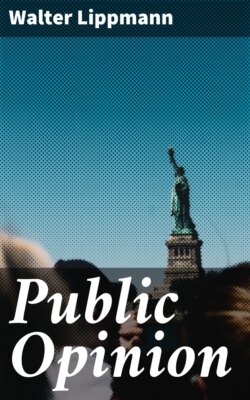Public Opinion

Реклама. ООО «ЛитРес», ИНН: 7719571260.
Оглавление
Walter Lippmann. Public Opinion
Public Opinion
Table of Contents
PART I. INTRODUCTION
PART II. APPROACHES TO THE WORLD OUTSIDE
PART III. STEREOTYPES
PART IV. INTERESTS
PART V. THE MAKING OF A COMMON WILL
PART VI. THE IMAGE OF DEMOCRACY
PART VII. NEWSPAPERS
PART VIII. ORGANIZED INTELLIGENCE
PART I
INTRODUCTION. CHAPTER I. THE WORLD OUTSIDE AND THE PICTURES IN OUR HEADS. CHAPTER I. INTRODUCTION
THE WORLD OUTSIDE AND THE PICTURES IN OUR HEADS
FACTS NOW ESTABLISHED
WITHOUT DANIELS' KNOWLEDGE
PART II
APPROACHES TO THE WORLD OUTSIDE. CHAPTER 2. CENSORSHIP AND PRIVACY " 3. CONTACT AND OPPORTUNITY " 4. TIME AND ATTENTION " 5. SPEED, WORDS, AND CLEARNESS. CHAPTER II
CENSORSHIP AND PRIVACY
CHAPTER III
CONTACT AND OPPORTUNITY
CHAPTER IV
TIME AND ATTENTION
CHAPTER V
SPEED, WORDS, AND CLEARNESS
PART III
STEREOTYPES. CHAPTER 6. STEREOTYPES " 7. STEREOTYPES AS DEFENSE " 8. BLIND SPOTS AND THEIR VALUE " 9. CODES AND THEIR ENEMIES " 10. THE DETECTION OF STEREOTYPES. CHAPTER VI
STEREOTYPES
CHAPTER VII
STEREOTYPES AS DEFENSE
CHAPTER VIII
BLIND SPOTS AND THEIR VALUE
CHAPTER IX
CODES AND THEIR ENEMIES
CHAPTER X
THE DETECTION OF STEREOTYPES
PART IV
INTERESTS. CHAPTER 11. THE ENLISTING OF INTEREST " 12. SELF-INTEREST RECONSIDERED. CHAPTER XI
THE ENLISTING OF INTEREST. I
CHAPTER XII
SELF-INTEREST RECONSIDERED
PART V
THE MAKING OF A COMMON WILL. CHAPTER 13. THE TRANSFER OF INTEREST " 14. YES OR NO " 15. LEADERS AND THE RANK AND FILE. CHAPTER XIII
THE TRANSFER OF INTEREST
CHAPTER XIV
YES OR NO
CHAPTER XV
LEADERS AND THE RANK AND FILE. I
PART VI
THE IMAGE OF DEMOCRACY
CHAPTER 16. THE SELF-CENTERED MAN " 17. THE SELF-CONTAINED COMMUNITY " 18. THE ROLE OF FORCE, PATRONAGE AND PRIVILEGE " 19. THE OLD IMAGE IN A NEW FORM: GUILD SOCIALISM " 20. A NEW IMAGE. CHAPTER XVI
THE SELF-CENTERED MAN. I
CHAPTER XVII
THE SELF-CONTAINED COMMUNITY
CHAPTER XVIII
THE ROLE OF FORCE, PATRONAGE AND PRIVILEGE
CHAPTER XIX
THE OLD IMAGE IN A NEW FORM: GUILD SOCIALISM
CHAPTER XX
A NEW IMAGE
PART VII
NEWSPAPERS. CHAPTER XXI. THE BUYING PUBLIC " XXII. THE CONSTANT READER " XXIII. THE NATURE OF NEWS " XXIV. NEWS, TRUTH, AND A CONCLUSION. CHAPTER XXI
THE BUYING PUBLIC
CHAPTER XXII
THE CONSTANT READER. I
CHAPTER XXIII
THE NATURE OF NEWS
CHAPTER XXIV
NEWS, TRUTH, AND A CONCLUSION
PART VIII
ORGANIZED INTELLIGENCE. CHAPTER XXV. THE ENTERING WEDGE " XXVI. INTELLIGENCE WORK " XXVII. THE APPEAL TO THE PUBLIC " XXVIII. THE APPEAL TO REASON. CHAPTER XXV
THE ENTERING WEDGE
CHAPTER XXVI
INTELLIGENCE WORK
CHAPTER XXVII
THE APPEAL TO THE PUBLIC
CHAPTER XXVIII
THE APPEAL TO REASON
Отрывок из книги
Walter Lippmann
Published by Good Press, 2019
.....
Try to explain social life as the pursuit of pleasure and the avoidance of pain. You will soon be saying that the hedonist begs the question, for even supposing that man does pursue these ends, the crucial problem of why he thinks one course rather than another likely to produce pleasure, is untouched. Does the guidance of man's conscience explain? How then does he happen to have the particular conscience which he has? The theory of economic self-interest? But how do men come to conceive their interest in one way rather than another? The desire for security, or prestige, or domination, or what is vaguely called self-realization? How do men conceive their security, what do they consider prestige, how do they figure out the means of domination, or what is the notion of self which they wish to realize? Pleasure, pain, conscience, acquisition, protection, enhancement, mastery, are undoubtedly names for some of the ways people act. There may be instinctive dispositions which work toward such ends. But no statement of the end, or any description of the tendencies to seek it, can explain the behavior which results. The very fact that men theorize at all is proof that their pseudo-environments, their interior representations of the world, are a determining element in thought, feeling, and action. For if the connection between reality and human response were direct and immediate, rather than indirect and inferred, indecision and failure would be unknown, and (if each of us fitted as snugly into the world as the child in the womb), Mr. Bernard Shaw would not have been able to say that except for the first nine months of its existence no human being manages its affairs as well as a plant.
The chief difficulty in adapting the psychoanalytic scheme to political thought arises in this connection. The Freudians are concerned with the maladjustment of distinct individuals to other individuals and to concrete circumstances. They have assumed that if internal derangements could be straightened out, there would be little or no confusion about what is the obviously normal relationship. But public opinion deals with indirect, unseen, and puzzling facts, and there is nothing obvious about them. The situations to which public opinions refer are known only as opinions. The psychoanalyst, on the other hand, almost always assumes that the environment is knowable, and if not knowable then at least bearable, to any unclouded intelligence. This assumption of his is the problem of public opinion. Instead of taking for granted an environment that is readily known, the social analyst is most concerned in studying how the larger political environment is conceived, and how it can be conceived more successfully. The psychoanalyst examines the adjustment to an X, called by him the environment; the social analyst examines the X, called by him the pseudo-environment.
.....